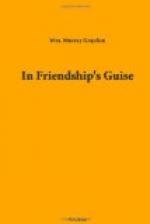“Does she think I am a fool, to be taken in so easily?” he said to himself. “It is a lie—a trick! Money is her game, of course. She wants to decoy me to her lodgings, and hopes to make me yield by threats of exposure. And yet she writes with a ring of sincerity—something like her old self in the first days of our marriage. Bah! it is only her cunning.”
He read the letter again, and pondered it.
“It was written yesterday,” he muttered. “The appointment is for to-night. What could she possibly have to tell me that concerns my future happiness? Nothing! And yet, if she should really be remorseful—By Jove! I will go! It can do no harm. But if I find that she has deceived me, and is playing the old game, by heavens! I’ll—”
Passion choked his utterance, and he concluded the sentence with a mental threat. He suddenly remembered that he had promised to meet Sir Lucius Chesney at eight o’clock that night.
“I can’t do it,” he thought. “I’m not fit to talk to any man in this mood. And he would probably detain me more than half an hour. No, I’ll write a short note to Sir Lucius, putting off the engagement, and leave it at Morley’s.”
Whether his decision was a wise one or not, was a question that Jack did not attempt to analyze. He proceeded to carry his plans into effect. It was then seven o’clock, and it took him twenty minutes to write the note to Sir Lucius and exchange his borrowed clothes for a dark suit of his own. He put Diane’s letter into a side pocket, so that he might be sure of the address, and then left the house. He did not take a cab, preferring to walk.
He handed the note in at Morley’s Hotel, and steered across Trafalgar square. At the top of the Haymarket, to his chagrin, he encountered Jimmie Drexell, who urged him to have a drink at Scott’s; he could not well refuse, as it was nearly a fortnight since they had met.
A quarter of an hour slipped by. Jimmie asked a great many questions, but Jack was preoccupied and uneasy, and scarcely answered them. He finally tore himself away on the plea of an urgent engagement, and promised to call at the Albany the next day; he was reluctant to confide in his friend. A distant clock was striking eight-thirty as he turned up the Quadrant.
Regent street was noisy and crowded, but Beak street was gloomy and misty, depressing and lonely, in contrast. Jack found the right number, and as he hesitated before the house—the door of which was partly open—a man came abruptly out. He was tall and slim, dressed in dark clothes, and with a soft hat that concealed all of his features except an aquiline nose and a black beard and mustache. He stared hard at Jack for an instant, then strode rapidly off to the eastward and was lost in the fog.
“A foreigner, from his actions,” thought Jack.
He pushed the door open, and mounted a steep and narrow staircase. Reaching the first landing, he saw a door on his left. At the bottom a faint streak of light was visible, but his low rapping brought no response. He rapped again—three times, and each louder—but with the same result.




